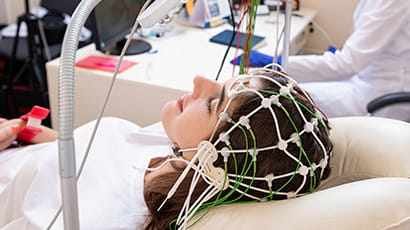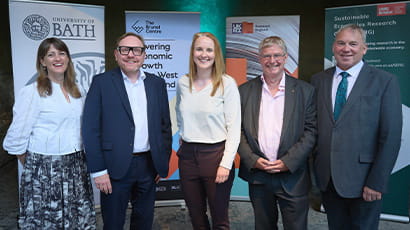'Life-changing' programme to help people with visible differences made public

A programme to help people with visible differences has been made publicly available for the first time.
FaceIT@home helps people manage appearance-related distress and anxiety via a self-guided online tool. The programme uses a cognitive behavioural therapy (CBT) approach and is aimed at people who may need support to feel more confident about the way they look.
FaceIT@home is a partnership project between the Centre for Appearance Research at UWE Bristol, the University of Plymouth and charity, Changing Faces.
The programme was previously only available via a referral from a health professional. Now the newly accessible online version has been warmly welcomed by charities and those living with visible differences, which can include anything from facial scarring, burns and plastic and reconstructive surgery to mastectomy or limb amputation.
Dr Heidi Williamson of the Centre for Appearance Research at the University of the West of England, and creator of ‘YP Face IT’ (a youth version of FaceIT@home), said: “I am delighted that the FaceIT@home programme is now being made widely available. It’s such a valuable and user-friendly tool that provides adults with the skills and confidence to manage the emotional and social challenges of living with an appearance affected by a wide range of conditions, injuries or treatment side effects.”
FaceIT@home can be accessed by contacting Changing Faces, with users directed to an extensive website that takes them through a course of eight different sessions including a mixture of presentations, interactive exercises and extensive guidance on how to put what has been learnt into practice. The programme is the result of years of research and testing, which has shown that the online version is as effective as face-to-face intervention, and in some cases preferred by users as they are able to go back to and benefit from it months or even years later.
Naomi Milward has been involved with the programme for many years, after suffering life-changing facial injuries in a road accident in Kenya in 2002. After struggling to access appropriate psychological treatment in Devon where she lives, Naomi was introduced to the project team and received a face-to-face version of FaceIT in 2008. Since then, she has been a passionate advocate for the programme.
Naomi said: “People often forget the psychological impact of injures like mine, as the physical difference can be so obvious to others. In my case when the accident happened at the age of 31, having had a successful career and a great lifestyle, the psychological impact was significantly harder to deal with than the physical impact.
“FaceIT helped me in so many ways. Going out in public initially was a massive deal for me – as I felt everyone was staring. This automatically created negative thoughts and frustration. Among other coping strategies, FaceIT teaches you to turn those negative thoughts into positive ones and think, OK they’re staring, but they might be looking at my dress. The programme gives you different scenarios and examples like this of how to manage negative thoughts and assumptions.
“For people who don’t want or can’t access face-to-face support, it will be incredibly beneficial for them to be able to access support in their own home.”
Dr Alyson Norman, Associate Professor of Clinical and Health Psychology at the University of Plymouth, said: “Visible difference covers a huge range of things, but there are probably four or five million people in the UK with a difference of some kind. Our research suggests that about 30 per cent of those people will suffer some degree of anxiety as a result, but we also know there is no strong correlation between the severity of someone’s visible difference and the anxiety they may experience – it is about each individual’s confidence level.
“FaceIT aims to do two things: help people manage anxiety, and help them learn how to manage interactions with other people and deal with their reactions.”
Becky Hewitt, Chief Executive, Changing Faces said: “We are delighted to partner with the University of Plymouth and the Centre for Appearance Research at the University of the West of England, to officially launch FaceIT@home in the UK.
“This is an unprecedented period of stress, anxiety and social isolation for everyone, and people with visible differences have been amongst those hardest hit. Being able to offer the FaceIT@home online service, developed with specialist psychologists, to anyone in the UK with a mark, scar or condition on their face or body that makes them look different provides another, much needed, source of specialist support for the visible difference community.
“Clinicians can refer clients, and individuals can sign up directly with Changing Faces to join the online self-help programme that is designed to build confidence, resilience and help develop coping strategies to deal with the difficult situations and feelings many people with visible differences contend with every day.”
Polly Brooks, MBE, CEO and Founder of Dan's Fund for Burns said: "Dan's Fund for Burns welcomes the launch of FaceIT@home for adult burn survivors. This new online support tool will provide an opportunity for anyone with a visible difference to work through their thoughts and emotions related to their physical appearance. This will enable them to strengthen their social skills needed for everyday living."
Related news

12 December 2025
UWE Bristol’s environmentally conscious and student-focused accommodation wins three awards
Purdown View, the world's largest certified Passivhaus student accommodation development, has been recognised at Property Week Student Accommodation Awards.

25 November 2025
Health-tech start up MyCelsius launches breakthrough cooling tech for hot flushes developed at UWE Bristol’s Launch Space
A pioneering Bristol-based health-tech company developing cutting-edge cooling technology for hot flushes has credited UWE Bristol’s Launch Space incubator with playing a key role in accelerating its product development.

14 November 2025
Lecturer wins prestigious Times Higher Education award for innovation in teaching
A senior paramedic science lecturer at UWE Bristol has been named the most innovative teacher of the year in the Times Higher Education Awards 2025.

13 November 2025
Alliance Medical and UWE Bristol launch UK’s first PET-CT postgraduate certificate
In a move set to transform imaging education, Alliance Medical (AML) and UWE Bristol have joined forces to co-design and develop the UK’s first PET-CT Postgraduate Certificate (PG Cert).

13 November 2025
New AI research to revolutionise animal welfare
A UWE Bristol research project will combine behavioural science and AI to create technology that understands not only what animals do, but how they feel.

29 October 2025
UWE Bristol academic unveils breakthrough in energy-efficient AI at NATO science forum
Dr Jonathan Lancelot has developed a new form of AI that could transform how intelligent machines operate in space, defence, and remote environments.

07 October 2025
Academic playing role in project to find hidden graves in Mexico using drone technology
A UWE Bristol lecturer is playing a part in a project using drone technology to locate concealed graves in Mexico.

01 October 2025
New funding for researchers to develop trustworthy clinical AI for assessing brain activity
Researchers have received funding from UK Research and Innovation to help bring their innovative brain-monitoring AI technology closer to real-world use.

11 September 2025
New study to investigate augmented reality as an intervention for emotionally based school avoidance
A UWE Bristol researcher will support a new study exploring whether an augmented reality board game can help young people with emotionally based school avoidance (EBSA).

22 August 2025
A decade of Future Space: How UWE Bristol’s enterprise zone is powering innovation and economic growth
Tracey John, Director of Research and External Engagement, reflects on the impact of Future Space and its role as a launchpad for cutting-edge companies shaping the future of how we live and work.

11 July 2025
Wound dressings developed with support from UWE Bristol to be launched by global firm
Technology that a team of UWE Bristol scientists helped develop to aid the healing of chronic wounds will be used in new ‘smart dressings’ being launched by global medical company.

03 July 2025
Research lab The Brunel Centre opens to power sustainable and inclusive growth for the West of England
A new data and research centre designed to support sustainable and inclusive growth and industrial strategy in the region, has officially launched.






